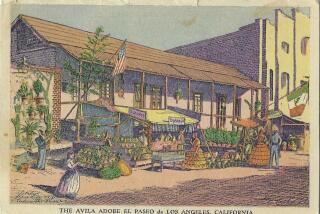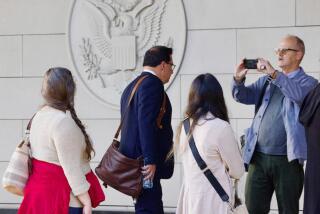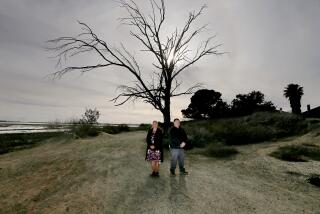Op-Ed: Goodbye, Columbus
Earlier this month, a committee of the Los Angeles City Council backed a plan to reframe Columbus Day as Indigenous Peoples Day, following the lead of Berkeley, Denver, Phoenix and the state of Vermont. The proposal now goes to the full council. It should vote yes, and the sooner the better. Giving Columbus Day a reset would represent a necessary reckoning with the nuances of American identity and history.
Columbus, after all, did not discover America, any more than Amerigo Vespucci or Sir Francis Drake did. It was here all along, home to a wide array of cultures and civilizations. The Taos Pueblo, in New Mexico, was founded more than 1,000 years ago — that is, about 500 years before Columbus “found” his first Caribbean island. Along with Acoma Pueblo, Taos is cited as the oldest continuously occupied settlement in the United States.
In California, Indigenous Peoples Day would carry particular resonance. The region has always been multicultural, populated by more than 70 ethnicities and tribes before the arrival of Europeans in the 16th century. Since then it has had a complex history, defined in many ways by clashing cultures.
Holidays are a declaration of what we find important, a recognition of our values and how they evolve.
Native tribes were virtually enslaved in Spanish colonial Alta California. Mexican rule was slightly better, but it gave way to Anglo encroachment that culminated in the independent Bear Flag Republic, which lasted just 25 days before the “revolutionaries” joined John C. Fremont’s California Battalion. Four years later, California was a state.
Californians romanticize this “colorful” past and gloss over its virulent, conquering racism.
Consider Los Angeles: Beginning in the 1920s, restrictive housing covenants prevented Latinos, African Americans, Jews and Asians from living in many Southern California neighborhoods.
“It was law,” the city’s new poet laureate Robin Coste Lewis recalls in her poem “Frame”: “we could not own property / except in certain codes: South Central, Compton, Watts, / where the construction companies were under contract / with the LAPD to tile or tar our addresses onto our roofs.”
In 1924, an epidemic of bubonic plague that killed nearly 40 people led to a quarantine of the city’s so-called Mexican District. As USC history professor William Deverell writes in his 2004 book “Whitewashed Adobe”: “There can be little doubt, given the way in which these neighborhoods were described, by language and perimeter, that officials perceived an overlap between ethnicity and disease.”
Southern California’s tensions provoked the Zoot Suit riots, the Watts riots, the Rodney King riots. Statewide miscegenation laws, banning interracial marriage, were not overturned until 1948. Los Angeles, the African American novelist Chester Himes remembered, “hurt me racially as much as any city I have ever known — much more than any city I remember in the South.”
For all the small-d democratic promise of Los Angeles, such realities are a large part of our collective heritage. I’m not suggesting that Indigenous Peoples Day would correct any of this; history doesn’t work that way. All the same, the change would be a nod in the right direction, acknowledging the massive disruptions of the past.
Opponents argue that renaming Columbus Day is an affront to Italian Americans, who have themselves been subjected to discrimination in the United States. One alternative would be to change the holiday to Immigrant Heritage Day, or keep Columbus Day but add a separate Indigenous Peoples Day. Practically speaking, that’s what will happen: Even as Indigenous Peoples Day catches on in cities and states, Columbus Day remains a federal holiday.
Still, the gesture matters. Holidays are a declaration of what we find important, a recognition of our values and how they evolve. Taking a stand on what Councilman Mitch O’Farrell — who proposed the name change — calls our “really devastating” history is particularly important in this era of government assaults on tolerance. We can only become better, more whole, by (in George Orwell’s phrase) facing unpleasant facts, changing that which needs to be changed.
In May, New Orleans Mayor Mitch Landrieu addressed this dynamic when he explained why it was fitting, finally, to dismantle his city’s monuments to Confederate leaders and battles: “The Confederacy lost and we are the better for it,” he declared.
Like him, I am arguing in favor of engaging with history as a living force. The history of Columbus Day itself offers a strong rationale for taking an evolutionary approach to the holiday. Although it was first celebrated in New York in the 1860s, it did not become a national event until 1937, when President Franklin Roosevelt yielded to pressure from the Knights of Columbus to honor a Catholic.
That’s a telling bit of business: Columbus Day was once its own version of Indigenous Peoples Day, a way of honoring our diversity. That the definition of diversity grows broader, more inclusive, can only be a good thing.
David L. Ulin is a contributing writer to Opinion.
Follow the Opinion section on Twitter @latimesopinionand Facebook
More to Read
A cure for the common opinion
Get thought-provoking perspectives with our weekly newsletter.
You may occasionally receive promotional content from the Los Angeles Times.







